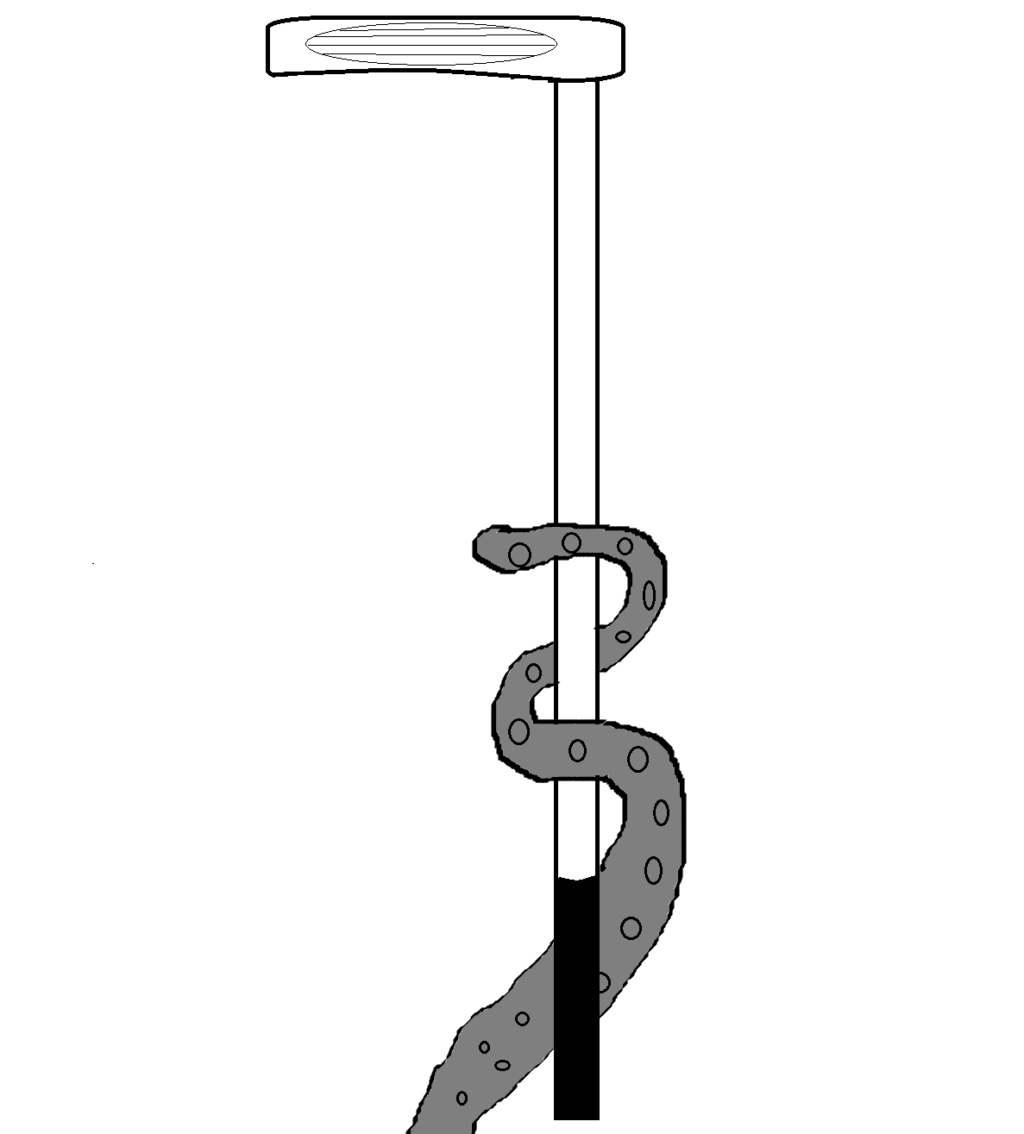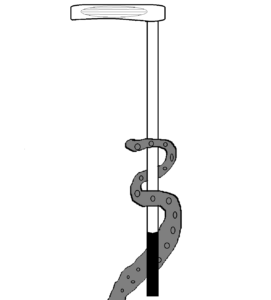
Tryouts
Tentacles, once fingers, squirm madly from my left hand. Before I can tear it away the glove bursts open. Control, I tell myself, control. I’m standing in the shadow of a dumpster in the parking lot, a hundred feet from the clubhouse, listening to chit-chat about cloud-decks beyond the trees, whether rain might come. A group passes by and the rattle of their metal clubs in canvas bags reminds me of the passage of trains. Remember why you’re here, I tell myself. Tryouts. Golf team. Sophomore year. Get yourself together. I repeat these words over and over and the riot of tentacles retreats. The suction cups fade, their violent blush receding to human fingers again. I open one of the pockets of my golf bag, find a spare glove, tug it on.
I loiter near the back of the group. Forty or so kids, vying for the six spots on the team. Our first hole is an up-slope par-four toward a green ringed by bulbous sand traps. Peeking above the rise in the hill is a blue flag, tickled by the breeze on the green. My turn. I take a golf ball and a wooden tee, one of the blue ones my father gave to me when he dropped me off, step forward and press the tee’s point into the damp earth. Legs apart, feet squared. Don’t look up during the swing. More thoughts in my father’s voice. Then I step back and walk over to my golf bag, slide the driver back in and remove the six-iron. Chatter on the tee, but I ignore it. I reposition myself, raise the club and swing it like a knife through water. I don’t look up as the metal strikes the ball, as the ball cuts through the breeze, as someone behind me mutters, nice shot. I look up and watch my ball settle on the right side of the fairway near the top of the incline, ahead of everyone else’s. A rush of pride, like my head’s been dunked in near-boiled water. I grin and follow the others down the rocky steps to the fairway. One by one, balls are knocked forward.
I feel invincible. I stick with the six-iron. Hot sun on my arms. But my swing is bad. The metal clubface chomps the grass and exposes soil. The ball soars past the green, out of sight. Goddamnit. Everyone is staring at the divot I’ve made. Shame bubbles inside me. Idiot. Why’d you think you could make the team? Why’d you agree to try out for the team? This isn’t your game. All those lessons were meaningless. My left hand quakes. I clench my hand around the club shaft and march past the sand traps and the balls of the other players arrayed like a white constellation around the hole. The breeze rises and the pin flag licks the blue sky. Goddamnit. I find my ball in the grass and swap my six-iron for a nine-iron. Gently, now, gently. Coax it forward. My father’s voice again, or maybe my uncle’s, maybe both, an amalgam of figures who’ve raised me. I swing the club back, only half-height, and let it fall. The ball arcs forward and plunks against the green, rolling about six feet before it stops, the furthest from the others. Because of this, it’s still my turn. Salty water drips from my left glove to the close-cut grass and I’m unsure if it’s merely sweat. I grab my putter from the bag and stand next to the ball, eyes on the green, weighing its slight tilt, how the wind nudges the world just left of me. I urge the ball on with the putter and, miraculously, it rolls right into the hole. My left hand quivers, then falls still.
But the next hole, I slice one into the woods. A fallen branch splinters beneath the thin sole of my shoe as I dig through the brush with my five-iron in search of my ball. One of the guys in my group said he saw it collide against the tallest of the trees. I think he’s lying. I turn and see them all clustered on the green, watching and leaning on their clubs. One of their mouths is in motion. I use my right hand because the fingers of my left are jelly in the glove. I look at the trees and imagine some path through in the direction of home. What I’d say when I get there. The response of my father’s face. How in the end I’d just hide in the deep end of the pool, the sun’s heat blocked at the water’s surface and reduced to white snakes on the floor.
When the first rotation around the nine-hole course is finished, I’m asked to wait while my group lines up for their next playthrough. One of the assistant coaches tells me: we’re shuffling things so we need you to hang back, bud. Scrawny, red-faced, red-haired giant who graduated from Montford High a few years back. I buy a Gatorade from the pro shop and lean against the warm wall outside, watching groups pass through the first hole again. After a while, the assistant coach returns and beckons me to a golf cart. We’re going to move you up, he says. So I lash my bag to the back and sit beside him. The cart whines and scrapes its way up the hill, tossing gravel behind us. He explains that I’ll shoot the fourth hole, a par-three, on my own, and then join with the group that just finished it. Okay, I say. The wheel of anxiety, never gone, spins unhindered. I feel very thirsty and stare at the now-empty Gatorade bottle. As we pull up to the tee, I recognize the stocky guy standing beside the pin. The head coach, Leary. Something of a local god. I remember hearing whispers as an incoming freshman about Leary and that weird rest area on the northern highway that juts across town, some discovery of him one night, a scandal clapped between powerful hands before it could spread beyond incredulous rumor. Still, here he is. Here for my assessment. Fuck. Damn. The assistant coach parks the cart and, after a quick look at Leary, guides me to the tee, instructs me on where to place the ball as if I’ve never played the game. The whole scene relaxes me and I play along, let him point out where my feet should go. My mind empties, my left hand is calm. I’ve got my seven-iron. Leary clears his throat. Then there’s only the wind and the chorus of oaken limbs and leaves and the distant honk of geese. I swing. The ball climbs, a dot against the sun. Then it plunks on the green and stops maybe three feet from the hole.
Good, says Leary.
As I descend from the tee and walk toward the green I think how his voice reminds me of my uncle’s and then I wonder whether they ever met. They must be around the same age. Both Montford born and raised. I think about what my uncle taught me about golf. What your dad told you is shit, he once said. Use the stance that feels right. Like finding a personal truth, the correct self, the absolute. He’d say this while sucking down a small cigar and waiting for me to take my shot first. We don’t play anymore, his mind now claimed by the abandon of disease, his mouth a stone, a living tomb in the sunroom.
I reach my ball and nudge it into the hole with the putter. I turn and watch the assistant coach wave. Leary is gone. At the next tee, my new group waits for me, suspicion shining in their eyes. More from the sporty crowd at school. You’re up, they say. I ready my ball and grab my driver. It’s a long hole now, par-five. Where the fairway starts to turn right looms a mammoth tree. Geese peck through the grass at its base. Don’t think about the others, I tell myself, in my own voice, no one else’s. I swing, too shallow, the driver’s face only clipping the ball. It bounces off the green to the start of the fairway, maybe forty feet, and rolls to a limp stop. Laughter from the group. I stuff the driver in the bag and the rubber grip thuds against the bottom.
We’re moving on, one of the group members says to me. Their eyes say don’t fuck this up for us. All I can do is sweat and nod as I take a separate path to my ball. I grab one of the irons, not sure which, sweating now, thinking of the bad shot. A twinge in my left hand. Come on, not now. I don’t wait to line up my shot as I swing. The clubface misses and gnaws the grass. Another swing. Another patch of grass chewed up. My left-hand fingers fatten and threaten to spike away from the club. I clap my right hand over them and whip the club back, swinging as hard as I can. The ball soars and strikes the trunk of the tree, then ricochets and smashes against one of the geese. The other birds panic and take flight. I hear holy shit from the group ahead but none of them move in my direction. I rush to the fallen bird. Its wings twitch on the grass, feathers spread around like debris from a sunken ship. In the distance, my group assembles on the green. I have been forgotten. The bird’s twitches stop and I think about the fact that I ended a life. Then my left glove bursts apart, fingers gone. Tentacles surge in size, my arm cleaves in two, suckers blooming up and down my wet pink skin. With my free arm I reach for my golf bag, grab it, ignore how the skin on my right hand is beginning to blush. I tug the remaining clubs from the bag and let them clatter on the fairway. I jam my tentacles into the bag. Though hidden, they drum against the inner wall of the bag. Then I see him: a kid no older than me, watching from the green, seeing all that I’ve become, his face ripe with sun.
Leaving my clubs piled like an unkindled campfire, I bound for the road on the other side of the fairway. Rubbery legs carry me over a waist-high wooden fence. As my feet hit the road my right shoe breaks apart and the asphalt burns my skin. Newborn tentacles slime the pavement. But enough of me is sturdy, upright, primal strong.
I can’t stay in this pool forever, but it’s safe. For now. The water is cool against my skin and the shadows of the trees stretch across the concrete bottom. A home-feeling. I can’t smile but joy fills me. I rush from one end of the pool to the other, again and again. I am all speed. I wonder what will come next. If and how I’ll hear my father’s voice when he gets the call about his missing son. He won’t search here first. But when he remembers my love of swimming and comes to check, I’ll spread against the bottom of the pool, lie flat as I can, still as stone, and my body will turn blue, true blue, so that when he looks at me he’ll quickly turn away, thinking only that the water appears as it should.
